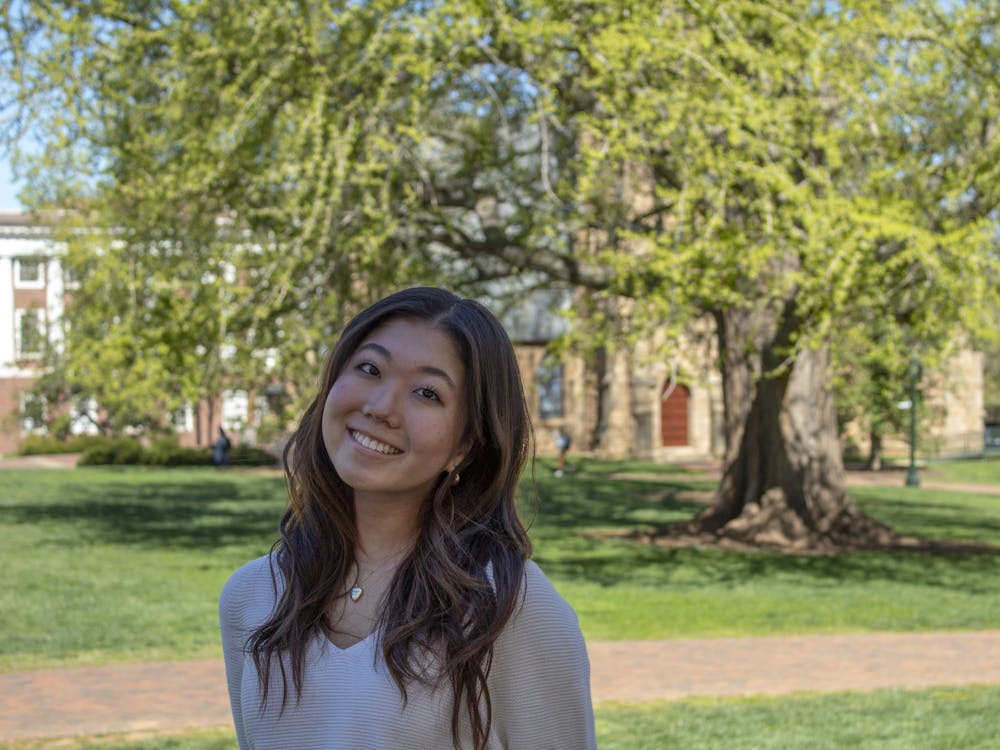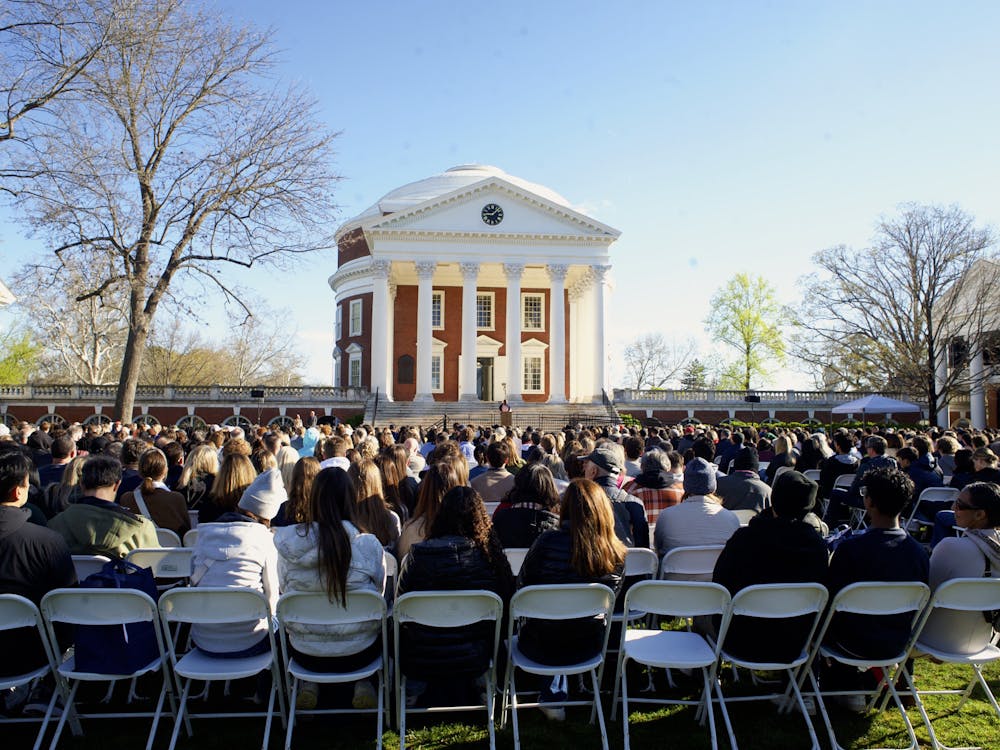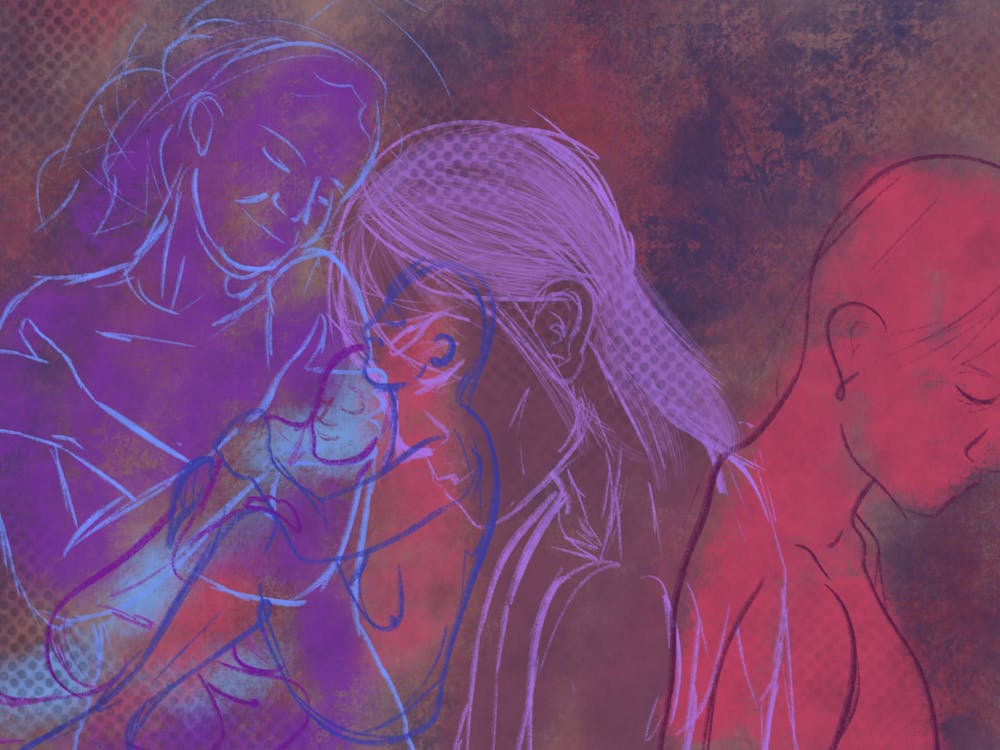Last week, after eating way too much ice milk, I waddled out of Newcomb dining hall and ran into a table of students offering a noble proposal: Forego the frozen treats (and other food) for one day so others can eat. Three minutes and a stomach rumble later I found myself mentally preparing to participate in one day of fasting with the Muslim Student Association. I would be one of 350 students non-Muslim and Muslim students combined participating in MSA's Fast-a-thon, and one of approximately six to seven million people who participate nationwide and about 1.2 billion worldwide during the month of Ramadan.
Last Thursday, the University MSA took part in the national MSA event to benefit the Charlottesville Emergency Food Bank.
"We went out to businesses around the community and we asked them to donate a dollar or two for each person that fasts," said MSA secretary Sylvia Ayub, a second-year College student. "We did this last year and we got 400 people to fast."
The rules of the event were simple: Sign the pledge and then no food or drink from sunrise to sunset (6:02 a.m. to 6:51 p.m.), no smoking (not a problem for me), no medicine, no gum and nothing intravenous (usually not a problem). If I could abstain from consuming for the 12 hours and 49 minutes, there would be a free meal with the MSA to celebrate the fast.
"MSAs across the nation have some event for it or another, but we do it as a community, as members of the University community," Ayub said. "Not a lot of people know about MSA or anything about Islam. This is a great way to reach out to the community and donate for charity because we wanted people to be aware of Ramadan and the entirety of the Muslim faith besides what they hear on the news."
Fasting, one of the five pillars of Islam, is a part of the Muslim holy month Ramadan that lasts 29 or 30 days, depending on the cycle of the moon. According to Ayub, fasting is the most important part, but the month includes many other aspects.
"Some of the most important days [on the Muslim calendar] happen during Ramadan," Ayub said.
So here is my account of the day:
5:30 a.m. My alarm goes off -- I was hoping to get a peanut butter sandwich and bottle of water under my belt before I began my fast.
5:50 a.m. I roll over in bed and realize I have 10 minutes to eat and drink enough to get me through the day. After a panicked attempt to eat half a jar of peanut butter, I brush my teeth, take my last sip of water and decide to stay up and watch the sunrise through my dorm window.
Ayub said Muslims declare their intent to fast each morning of Ramadan and then pray the morning prayer, Fajr. I declare my intent to fast to the sunrise and my plant, Tolly, and I try to remember what Ayub told me about the experience:
"Basically, it's a way to purify yourself," Ayub said. "It's so you feel how poor people feel when they don't have anything to eat. It's just a month of prayer and it's really about becoming more aware of your surroundings."
7:30 a.m. I wake up again, realizing I fell asleep mid-sunrise and I have 15 minutes to get out the door for my 8 a.m. class. I glance at the Special K with a little bit of longing and contemplate making myself a sign -- "I'm fasting today, be proud of me!"
This sort of showmanship does not seem to be in the spirit of the day, so I head off to my first class, morale high.
8:50 a.m. At least five times during class I start to rise to go get a sip from the water fountain and sit back down abruptly. The guy in the seat next to me thinks I'm doing some kind of funky dance. I make it through the first class of the day and decide to be ambitious and run errands ... maybe I'll skip the groceries.
11 a.m. The first hunger pangs are starting to set in. I try to find an anchor to keep my car from steering me toward Panera.
"The best thing would be just to keep an open mind and realize that people do this every day for years," Ayub said. "This is like a normal part of our lives."
12:30 p.m. I am almost halfway through the day, but it's lunch time. I walk into The Cavalier Daily offices to find an array of bread ends with the delightful Take It Away dressing. Phew.
"I think remembering that, even if we are hungry right now, there are so many people around the world that are in far worse conditions than us and that we should be thankful," Ayub said. "That's basically the spirit of Ramadan, to be thankful for what we have."
I begin to make a list of things I'm thankful for to take my mind off the hole that is growing in my stomach. I am thankful for my family, I am thankful for my education, I am thankful that most days of the year I do have enough to eat. It actually works. Soon I am not only over the hunger, but I am feeling pretty proud of myself, too. I am thankful I am able to do this.
2 p.m. The hunger part is gone but I feel a little light-headed. I would really just like a big glass of water, but no, I am thankful that in four hours I will have fresh, non-contaminated water to drink.
I have a bit of lag time now because I didn't take the extra time I usually do for a delicious dining hall lunch.
"Usually [fasting] is just like a regular day," Ayub said. "You don't feel it as much. I like it because I find I have more time to study because I'm not busy at lunch or at Newcomb or something like that -- I go to the library and study."
A short stint of studying later and I'm off to my last class of the day. At two and a half hours long, it could be my greatest challenge yet. But I can do it.
4:30 p.m. I'm counting the minutes now, writing them down on the side of my notepad, thinking about the meal I'm going to get to consume in only a few short -- I'm being optimistic -- hours. I've said "What?" about 12 times now, and I took a chance during the break to explain to my friends in the class why I'm so out of it. I can't imagine being in a situation Ayub described to me the day before:
"A lot of us have classes right when it's time to break our fast, and it's kind of difficult because you're trying to pay attention in discussion and you want to eat, because you haven't eaten in 11 hours," Ayub said.
That killed a little time: exactly two hours to go.
6:05 p.m. My last event before I go to break fast at the Student Activities Building with the other students who participated in the day is a meetingof the Life section that I should be helping to conduct. Luckily, my co-editor takes the reins so I don't have to pretend I know what everyone is talking about. Less than an hour left.
6:43 p.m. I drive up to the SAB at a breakneck speed -- I intended to tell any cop who tried to pull me over that I'd been fasting all day and, if he didn't let me go, I would gently eat his arm. I walk into the door and, for the second time that day, my hunger melts away and I stand a little in awe of the group that has gathered.
"Ramadan brings the community together," Ayub said. "It's just like that feeling, and then when you're fasting you realize how important it is, you just feel like this is the right thing to do and you feel like you're actually doing something in the name of God."
All of the students look a little haggard, but also pleased with themselves. I say hello to some of my Muslim friends, and then find a seat with two first-timers and we talk about how neat the experience has been.
After a few speakers (fast talkers -- they knew we were all hungry) and a presentation of $600 to the Charlottesville Food Bank, we break our fast with the traditional dates and lemonade. Dinner is delicious, and afterward we all agree that we feel almost uncomfortably full. I lived without for a day, and I find myself thinking, "I could do it again."
Ayub said the entire community comes together for Ramadan, and MSA hosts other events for Muslim students to help them enjoy the month as much as possible.
"There's a night where IHOP is half-off, so we take students to go to IHOP," Ayub said. "It's just a way to connect with the community because everyone is so spread apart, but at this time everyone comes together."
Ayub said especially in the last few years when Islam has gotten a bad rap from the media, this event is important to show people what Islam is all about.
"The only thing that people realize about Islam is the terrorists," Ayub said. It's important "to realize that there is this charitable side to it and there's this entire other side that's never really focused on."
She emphasized the MSA's role in shaping University opinion.
"We wanted people, when they hear the word 'Muslim' at U.Va., not to think about 9-11 or anything like that, but to think about the Fast-a-thon and other activities that we've done here," she said.




